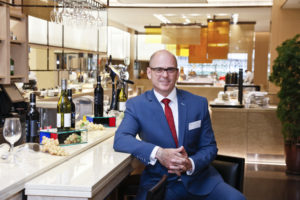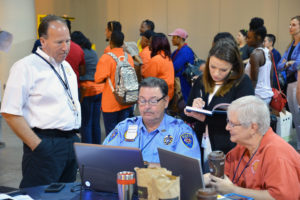Trying To Make Sense Of The Senseless Attack In Manchester
It has taken me more than 48 hours since the horrific attack on innocent people outside the Manchester Arena on Monday night to write something about the senseless carnage. As the editor of Facility Manager magazine and an employee of the International Association of Venue Managers, I have a vested interest and concern about what happens in the world of public assembly venues. And in this case, I do mean the world.
The tragedy and loss of 22 lives and several more injured happened in the United Kingdom. It could have happened in Garland, Texas, just to use an example (which it did).
On any given night around the world, there are thousands of scheduled events taking place with audiences of all sizes held at venues of all capacities. It is a concert here. It is a soccer match there. It is a car show here. It is an opera there. It is a carnival here. It is a fair there. It is a movie here. It is a church gathering there.
It is people going out to live and love life at the venues our members manage as well as countless other venues who have no idea what IAVM is. That is OK. We are talking about celebrating what we enjoy, going someplace to laugh, cheer, watch, worship, participate. It is the essence of social human existence, something that human beings we need to exist. Social interaction, we call it. Being in a community of like believers and fans.
On this particular Monday night outside this particular arena in this particular city, all of that was brought to a halt in the most unimaginable way possible. A terrorist kills himself in order to also claim innocent lives.
Words really do fail at a time like this. I often thought the phrase “I don’t have the words …” was just a cliché, but when something like this happens, well, what do you say? We support even when we don’t have solutions, at least those of us who are not professionally equipped to address and find solutions when tragedy strikes.
We rightfully say that our thoughts and prayers are with the families of those whose lives were taken as well as the survivors. Please don’t let that become a cliché. If you are not the praying type, then by all means please do have your thoughts with our friends in Manchester. And if you are the praying type, then please have your prayers as ongoing, because these folks do need our prayers for their strength and comfort at this time and going forward.
Several IAVM staff met the morning after the tragedy to discuss our Association’s response. I have never been prouder to be on a staff and team that cares so much about this wonderful industry. We are not venue managers, but I know that each and every individual who works at IAVM deeply cares about not just our members and their venues, but what happens at other venues as well.
As you might expect, our president and CEO, Brad Mayne, has been overwhelmed from media seeking comment, as has Chairman Mark Mettes. Our director of education, Mark Herrera, has given numerous interviews to local and national publications, radio and television. We are fortunate to have someone with Mark’s security background and training on our staff.
In our Tuesday meeting, Mark spoke about how this diabolical act took place after an Ariana Grande concert concluded and people were leaving the venue. We often think about safety and security before an event, from the parking lot to bag searches to magnetometers and more. We don’t want the bad guys in the venue with us, but what about when they are lurking in the shadows outside the building? When the show ends, doesn’t everything seem anti-climactic? The curtain raises. The lights go up. A voice might or might not be on the PA system to tell everyone thank you for coming and to please drive safe on your way home. Aren’t we all supposed to get home when we leave?
I thought back to John Wilborn’s story in the January/February issue of Facility Manager as he recounted the full scope of what happened at the Curtis Culwell Center in Garland, Texas, when two armed terrorists arrived to cause destruction and death as people were leaving that venue following an event. Fortunately, the bad guys were killed by police before they could cause harm.
Unfortunately, the same did not happen this time. Lives were lost, and we mourn and hurt for the senseless violence. But we stand with the city of Manchester, the Manchester Arena, its staff and everyone there who has a role at the facility.
And those bent on violence always need to know this: Manchester, Garland, or anywhere else, the show WILL go on.
Safety And Security Resources for the Global Venue Industry

As more details about the recent attack at Manchester Arena emerge, IAVM has been contacted by media and public assembly managers from around the world regarding the safety and security of guests, artists, teams, and venue professionals, as well as how facility management should plan and be better prepared to address any potential issues that could potentially undermine a safe and secure environment in their unique venues.
There has never been a more compelling need to raise the bar and establish industry security guidelines and training than the present. It is imperative that we begin utilizing all the available training resources to prepare for any potential risk or hazard. It is important that training, especially post-crisis, is properly vetted for effectiveness.
IAVM advocates a proactive approach to preparing staff and reviewing all emergency evacuation plans, any emergency procedures and protocols, through effective on-going training. Training and other resources are widely available through many associations, Federal, Local & State Agencies, as well as through IAVM’s Academy for Venue Safety & Security, Live- Life Safety Training, EMSSI, and the educational programming at VenueConnect Annual Conference.
If you are not sure where to start, let us help. You can begin by contacting IAVM at 972-538-1000 or visit our website at iavm.org.
Thank you for all you do every single day to make our venues safe and secure.
Paul Jeffrey Chandler To Head F&B Team At Hong Kong Convention and Exhibition Centre
Hong Kong Convention and Exhibition Centre (Management) Limited (“HML”) announced the appointment of Paul Jeffrey Chandler as its new Director of Food & Beverage. HML is the professional private management and operating company for the Hong Kong Convention and Exhibition Centre (“HKCEC”).
As a member of the Executive Leadership Committee, Chandler oversees the operation of HML’s Food & Beverage Division. He leads a  team of 330 professionals responsible for F&B event planning and coordination, along with catering services, the Western and Chinese kitchens, the HKCEC’s seven restaurants, and concession stands set up during large exhibitions and other events at the HKCEC. In his role, he will enhance the reputation and service quality of HML’s food and beverage services, as well as further raise the quality of guest dining experience.
team of 330 professionals responsible for F&B event planning and coordination, along with catering services, the Western and Chinese kitchens, the HKCEC’s seven restaurants, and concession stands set up during large exhibitions and other events at the HKCEC. In his role, he will enhance the reputation and service quality of HML’s food and beverage services, as well as further raise the quality of guest dining experience.
Chandler has over 30 years of sound hospitality background gained through various senior positions in international hotels in Mainland China, Hong Kong, UK and Australia. Prior to joining HML, he was Director, Food & Beverage Operations of Shanghai Disney Resort, overseeing the preopening plans and daily operations of all in park outlets, hotel restaurants and banquet services. Before relocating to Shanghai in 2012, he held a similar position at the Hong Kong Disneyland for more than three years.
Thomas Tong, Deputy Managing Director of HML, commented, “I am delighted to welcome Mr. Chandler to HML. With his extensive background and achievements in the hospitality industry, I am confident that he will drive F&B innovation and service standards into new heights, and will strengthen the HKCEC’s brand image both in Hong Kong and internationally.”
During the fiscal year 2015-2016 (July 2015 to June 2016), 2.4 million guests from around the world enjoyed F&B services at the HKCEC as attendees to 400 banquets, patrons of HKCEC’s seven restaurants or participants of 1,149 exhibitions and other events, some being the world’s largest and most prestigious trade shows.
“I am excited to join the winning team behind Asia’s best convention and exhibition centre,” Chandler said. “I look forward to working closely with them to meet the high expectations of customers and stakeholders from all backgrounds and nationalities and deliver great experiences to our guests.”
Manchester Blast Kills 22; Injures Dozens More

MONDAY, MAY 22 – In a devastating attack following an Ariana Grande concert on Monday, May 22, 22 people were killed and dozens more injured. According to multiple news sources, the explosion took place shortly after 10:30 PM as concert attendees were exiting the Britain’s Manchester Arena following the performance. The following facts are from CNN, Fox News, NBC News, and Aljazeera:
- Children are among the 22 dead
- At least 56 more were injured and being treated at surrounding hospitals
- An improvised explosive device was used by one man, who also died on scene
- Police arrested another 23-year-old man in connection with the attack
Concerned families and helpful citizens took to Twitter and other social media, some sharing photos of those who are missing and others offering to provide transportation and even places for stranded people to stay.
The following is a statement from IAVM’s Board of Directors Chair, Mark Mettes, CFE:
“Yesterday, we saw more tragic events that serve as heartbreaking reminders of what can happen in this world. There are still many facts in this situation that we don’t know yet, but we do know that this senseless tragedy will impact people far beyond those who attended the concert. Our thoughts and prayers go out to all those who have been touched by this attack, especially all of the young victims and their families.
I also include our facility manager colleagues at the Manchester Arena because they will be touched by this tragedy for the rest of their lives. Although we would love to reach out and help them in some meaningful way, we must recognize through this tragedy the importance of individual and institutional preparedness. In these times, we must remind ourselves of our personal responsibilities at our venues. Please make time to review your own Emergency Evacuation Plans and any Emergency Procedures your venue has for Staff. If your venue doesn’t have these plans or procedures, I strongly encourage you to reach out to the leadership of your venue and do your part in taking the necessary steps toward preparedness. If you aren’t sure what to do and where to start, please reach out to IAVM. We can certainly help.
Also, whether you are in your own venue, visiting another or just out in public, please remember if you see something, say something. Report suspicious activities to your local law enforcement. Every one of us plays an important part in keeping our venues and our communities safe.
Obviously we hope that nothing like this tragic event would ever happen again anywhere in the world, but we can each do our part to be prepared in case an emergency situation comes closer to home.
Thank you.”
New Orleans’ First Full-Scale City-Assisted Evacuation Exercise Held At Ernest N. Morial Convention Center
The New Orleans Office of Homeland Security and Emergency Preparedness (NOHSEP) joined local, state and federal public safety officials to host the first full-scale exercise of the City Assisted Evacuation system at the New Orleans Ernest N. Morial Convention Center last week.
Hundreds of volunteers “role played” as evacuees and helped representatives from various agencies practice the steps required to  safely evacuate residents in the event of a city-wide emergency. City-Assisted Evacuation provides transportation from 17 Evacuspots to the Union Passenger Terminal (1001 Loyola Ave.) where individuals then board a bus to a State or Federal shelter out of harm’s way.
safely evacuate residents in the event of a city-wide emergency. City-Assisted Evacuation provides transportation from 17 Evacuspots to the Union Passenger Terminal (1001 Loyola Ave.) where individuals then board a bus to a State or Federal shelter out of harm’s way.
In 2015, the City received a $500,000 grant from the U.S. DOT Federal Transit Administration (FTA) to support a full-scale simulation exercise of the City-Assisted Evacuation plan, with special emphasis on vulnerable/special needs populations.
Do you want to receive a Front Row News weekly digest?
Categories
- Allied (861)
- Architecture (147)
- Arenas (747)
- Career (897)
- Convention Centers (895)
- Education (623)
- Events (1,544)
- Food & Beverage (193)
- Foundation (113)
- Guest Experience (1,496)
- Industry News (2,270)
- Leadership (1,888)
- Marketing (150)
- Membership (2,000)
- Music (213)
- Performing Arts Centers (454)
- Professional Development (409)
- Research (127)
- Safety & Security (442)
- Sports (763)
- Stadiums (608)
- Student (159)
- Technology (516)
- Ticketing (92)
- Touring (82)
- Trends (364)
- Uncategorized (741)
- Universities (218)
- Video (25)
- Young Professional (198)
Twitter Feed
- Twitter feed loading
Recent Posts
- Peggy Daidakis Humbly Made Convention Center History
- Welcome to Our Newest Members
- New Member Benefit! IAVM Partners with Advantage Training to Elevate Staff Readiness and Guest Experience
- Charlotte Convention Center Welcomes Two New Leaders to its Management Team
- Fort Worth Cuts Ribbon on Phase 1 of Convention Center Expansion
Categories
- Allied
- Architecture
- Arenas
- Career
- Convention Centers
- Education
- Events
- Food & Beverage
- Foundation
- Guest Experience
- Industry News
- Leadership
- Marketing
- Membership
- Music
- Performing Arts Centers
- Professional Development
- Research
- Safety & Security
- Sports
- Stadiums
- Student
- Technology
- Ticketing
- Touring
- Trends
- Uncategorized
- Universities
- Video
- Young Professional
Archives
- December 2025
- November 2025
- October 2025
- September 2025
- August 2025
- July 2025
- June 2025
- May 2025
- April 2025
- March 2025
- February 2025
- January 2025
- December 2024
- November 2024
- October 2024
- September 2024
- August 2024
- July 2024
- June 2024
- May 2024
- April 2024
- March 2024
- February 2024
- January 2024
- December 2023
- November 2023
- October 2023
- September 2023
- August 2023
- July 2023
- June 2023
- May 2023
- April 2023
- March 2023
- February 2023
- January 2023
- December 2022
- November 2022
- October 2022
- September 2022
- August 2022
- July 2022
- June 2022
- May 2022
- April 2022
- March 2022
- February 2022
- January 2022
- December 2021
- November 2021
- October 2021
- September 2021
- August 2021
- July 2021
- June 2021
- May 2021
- April 2021
- March 2021
- February 2021
- January 2021
- December 2020
- November 2020
- October 2020
- September 2020
- August 2020
- July 2020
- June 2020
- May 2020
- April 2020
- March 2020
- February 2020
- January 2020
- December 2019
- November 2019
- October 2019
- September 2019
- August 2019
- July 2019
- June 2019
- May 2019
- April 2019
- March 2019
- February 2019
- January 2019
- December 2018
- November 2018
- October 2018
- September 2018
- August 2018
- July 2018
- June 2018
- May 2018
- April 2018
- March 2018
- February 2018
- January 2018
- December 2017
- November 2017
- October 2017
- September 2017
- August 2017
- July 2017
- June 2017
- May 2017
- April 2017
- March 2017
- February 2017
- January 2017
- December 2016
- November 2016
- October 2016
- September 2016
- August 2016
- July 2016
- June 2016
- May 2016
- April 2016
- March 2016
- February 2016
- January 2016
- December 2015
- November 2015
- October 2015
- September 2015
- August 2015
- July 2015
- June 2015
- May 2015
- April 2015
- March 2015
- February 2015
- January 2015
- December 2014
- November 2014
- October 2014
- September 2014
- August 2014
- July 2014
- June 2014
- May 2014
- April 2014
- March 2014
- February 2014
- January 2014
- December 2013
- November 2013
- October 2013
- September 2013
- August 2013
- July 2013
- June 2013
- May 2013
- April 2013
- March 2013
- February 2013
- January 2013
- May 2012
- March 2012
- December 2011
- November 2011
- October 2011
Recent Comments
- Frank Bradshaw, Ph.D., CVE on John Meyer, CVE, a Tireless Advocate of Certification for Venue Professionals, Has Died
- Neil Sulkes on Hilary Hartung, Friend to Many in Venue Marketing, Has Left Us
- Jason Parker, CVE on The Devastation of Hurricane Helene and How We Can Support One Another
- Larry Perkins on Touhey Testifies Against Speculative Ticketing Before Congressional Subcommittee
- Peter Secord on Major Players for Planned Elkhart Amphitheater Were in the Mix at VenueConnect
